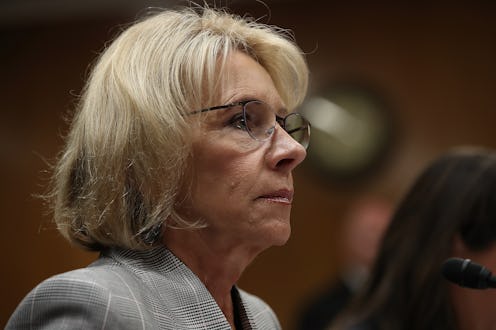News
After Florida, Betsy DeVos Thinks We Need To Talk — About Arming Teachers

As education secretary, Betsy DeVos is in a singular position to respond to America's most recent mass shooting in a school setting. And in an interview Thursday with conservative talk show host Hugh Hewitt, DeVos responded to the shooting at a Parkland, Florida, high school by suggesting arming teachers could prevent future violence.
In the interview, DeVos appeared to minimize the federal government's role in responding to gun violence at schools by focusing on what states can do to prevent it. Referring to the option of allowing teachers to carry guns on campus, DeVos said, "This is an important issue for all states to grapple with and to tackle." She also called for a "broader, more robust conversation" about how to go about ensuring all students "go to a safe and nurturing environment" at their schools.
Eight states already allow teachers who have a concealed carry permit to bring their guns onto school campuses, and in dozens of other states, there are legal loopholes that allow school faculty members to take their guns with them on the job, as well.
There is widespread disagreement about the benefits of arming teachers. Yet just two days after a gunman killed 17 students and faculty members at the high school in Parkland, Republican lawmakers were already working toward changing laws in the Sunshine State to allow teachers the right to bear arms on campus.
As of now, Florida bans firearms on school campus grounds, but if state lawmakers are successful, then teachers who pass a background check and earn the state's Criminal Justice Standards certification will be allowed to take their guns with them to work. The program is modeled on a similar effort implemented in two north Texas school districts. Both programs have been in effect for just a few years, and so far they have received general approval from parents and community members.
But outside research suggests that more guns does not lead to less gun violence. A study published in 2013 from Boston Children's Hospital, Harvard Medical School, and Harvard School of Public Health concluded, "A higher number of firearm laws in a state are associated with a lower rate of firearm fatalities in the state, overall and for suicides and homicides individually." In other words, the more restrictions a state put on gun purchases, the lower the rate of gun violence in that state.
And as others have pointed out, there's scant evidence that armed citizens prevent or blunt a shooter once their weapon is drawn and active. A Twitter user at the handle @markpopham wrote a Twitter thread on Chris Kyle, the Navy Seal whose life was portrayed in the film American Sniper. The thread went viral as it pointed out that Kyle — almost certainly the most skilled shooter in the world — was armed when another man shot him. This happened, despite Kyle's unparalleled training and the fact that he was already wary of the young man who killed him.
But others argue there is evidence that armed civilians can and have stopped shooters from killing more people than they'd planned. Washington Post contributor Eugene Volokh cites 10 such examples, noting that it's impossible to know what any shooter would have gone on to do had they not been interrupted by another person with a gun.
Since Republicans by and large are wary of any gun control measures, and they currently control Congress and the White House, it's difficult to imagine a scenario where new legislation is passed in the near future. But as the nation mourns yet another tragedy of children gunned down at school, it defies belief that Washington can continue on the path of doing nothing to stop the next attack.